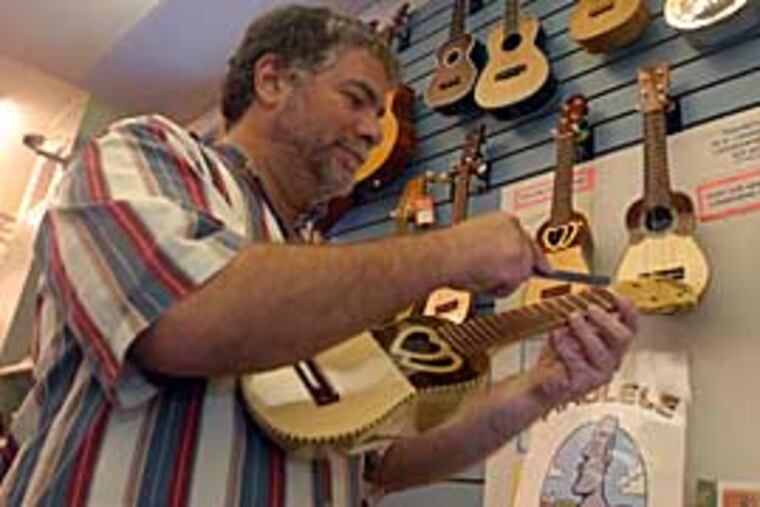Tiptoeing no more
A revival of the sweet-sounding ukulele is stimulating Philadelphia's music scene, with classical, jazz and even rock sounds.

What do Arthur Godfrey, Tiny Tim and Will Brown have in common?
If you're of a certain age, you can guess what it is. If you're 13-year-old Will Brown, your face takes on a just-sucked-lemons expression when Tim - may he and "Tiptoe Through the Tulips" rest in peace - is mentioned.
"I hate Tiny Tim. He made a fool of the ukulele," Brown, who lives in Narberth, says before taking the stage at Ardmore's MilkBoy coffeehouse. "He made people think it's a toy, that it's something to be made fun of."
Rather, Brown says, cradling his own uke, "it's fun and there's just something about it that makes me feel good."
Will's no specious shill. A revival is going on around the world, as young and old find the ukulele to be just the natural, four-stringed stimulant they need. It's easy to play, sounds sweet, and is involuntarily smile-inducing.
This resurgence has been fueled by a young Hawaiian musician, Jake Shimabukuro, who played at this year's Philadelphia Folk Festival.
Shimabukuro does a remarkable cover of "While My Guitar Gently Weeps" on the ukulele. A YouTube video of him playing it has inspired a new generation of ukulele fans. That includes Brown, an eighth grader at Welsh Valley Middle School, who skillfully plays the George Harrison song at MilkBoy.
"I think a lot of it has to do with the fact that, to my way of thinking, it's time for an alternative to the guitar," says Jim Beloff, author of The Ukulele, a Visual History. "I think people are just having a ball taking it into wonderfully unexpected places."
He means musical places - classical, jazz and rock. But the ukulele also is in Lansdowne and New Zealand - which, granted, is not around here, but does have a uke orchestra.
Philadelphia's first all-ukulele festival, "One Nation Under a Uke," begins today at 7 p.m. with an open mike at the Green Rock Tavern on East Lehigh Avenue, followed by performers doing songs from traditional to obscene.
The ukulele's epicenter is Hawaii, though its precursor came from Portugal's Madeira island as a four-string instrument called the machete. It arrived in Honolulu by ship in 1879, according to Beloff, and spawned the ukulele.
The instrument has had three waves of mass popularity. First, Tin Pan Alley composers seized upon it and Hawaiian-theme songs after World War I and in the 1920s. The second wave came as entertainer Arthur Godfrey popularized it on his TV show in the 1940s and 1950s.
The latest wave started about 10 years ago, says Joseph Todaro, 46, of Todaro's Music in Lansdowne. He designs a line of well-regarded ukuleles and Bolivian charangos (a cousin of the ukulele) that are sold in the United States and Europe.
Todaro grew up in Delaware County and earned a bachelor's degree in music education at West Chester University. He was all about classical guitar in the 1980s until, listening to a world folk program on WXPN, he was smitten by music from the Andes played on a charango. He went to Bolivia and made friends with craftsmen there.
Later, Todaro heard a recording of a renowned Hawaiian ukulele player and fell in love with the instrument's harplike tone and versatility. "I saw a palette for creating classical music on it," he says.
Todaro selects the wood for his string instruments and sends it to Bolivia, where those friends produce his line of ukuleles, charangos and mandolins. His Lansdowne store is a little-known global gold mine of familiar and unusual instruments, including a range of his own and others' ukuleles and charangos.
Philadelphia has many uke players, he says, but the scene is not organized.
Steve Morasco hopes tonight's show will be the start of a ukulele community. He and son Junior, 11, will perform as the Snakeoilers.
"I got into punk and metal because it's rebellious and different," Morasco, 46, says. "Now, every frat boy has a metal band screaming, 'Ahhhhhhhhhhh.' "
It's playing the ukulele that's rebellious these days, he says. But never has a revolt produced such joy.
"Some of the lyrics I deal with are more subversive," Morasco says. But when he's singing them with that ukulele accompaniment, "people still always clap and cheer. The uke just makes them happy."
EndText